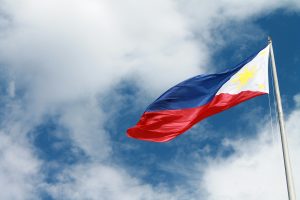The ongoing Russia-Ukraine war testifies to a new world disorder. The advanced democracies are watching the situation with grave concern, imposing and enforcing economic sanctions with the hope of bringing Russian President Vladimir Putin to his knees. This has led the authoritarian leader to designate them as “unfriendly countries.” Given that the United Nations has no binding mechanism by which to stop Moscow’s invasion despite the recent condemnatory U.N. General Assembly (UNGA) resolution, states have to decide whether the international system should transform for better or worse.
Such is the case in the Philippines. During the six years of Philippine President Rodrigo Duterte’s leadership, Manila has ventured to diversify its relations with non-traditional partners, such as China and Russia, breaking with its long-standing U.S.-centric strategic calculus. This comes at a time when Beijing and Moscow are seeking to revise the U.S.-led, rules-based international order, making Duterte’s foreign policy controversial both at home and abroad.
In an article last year, I explained that Philippine-Russian relations had improved during Duterte’s term in office, and were likely to see continued, albeit modest, growth even after his exit, a by-product of the current structural shift toward a multipolar order in the Indo-Pacific region. But whether the ongoing war between Russia and Ukraine will impact the future trajectory of Philippine-Russian relations deserves attention. The relations between Manila and Moscow are unlikely to “fall from great heights” since there is not much to lose in that relationship to begin with. That is notwithstanding the adverse impacts that the ongoing crisis may pose for the Philippines itself in the short and long term.
The first thing to note is that Russia lacks formidable hard and soft power with which to influence the Philippines. Although Duterte’s presidency failed to tap the full potential of bilateral relations, this is as much a result of Russian failures to convince the Philippine establishment to deepen cooperation with Moscow.
Following Duterte’s outreach in 2016, Russia mainly took the opportunity to expand defense relations. Specifically, it engaged Manila with port calls, naval exercises, and arms sales and donations. In 2017, the two countries signed a memorandum of agreement on defense cooperation, resulting in the dispatch of Russian and Philippine defense attaches to their respective capitals.
Not everything has worked out. Russia, for instance, failed to secure a deal on submarine acquisition for the Armed Forces of the Philippines (AFP), after the Philippine Department of National Defense narrowed its bid down to a choice between French and South Korean shipbuilders last year. Meanwhile, the Philippines’ procurement of 17 Mi-17 heavy-lift helicopters for the AFP has become a subject of controversy due to the logistical, financial, and political repercussions that it may entail amid the ongoing war. Manila has stated that it was determined to honor the deal but eventually changed its tone, announcing that it would “review” the procurement instead. Furthermore, Manila did not attend the naval interoperability exercise proper of the first ASEAN-Russia Naval Exercise (ARNEX) held in December last year.
On vaccine diplomacy, a report by the ISEAS Yusof-Ishak Institute notes that only 4 percent of Filipino respondents preferred Russia’s Sputnik V, compared to the 54.5 percent who preferred the U.S.-developed Pfizer and Moderna vaccines. On the economic front, total trade between the Philippines and Russia increased from $486.3 million in 2010 to $862.8 million in 2020. Yet, this can only be deemed modest, and Russia remains only the Philippines’ 31st top trading partner. Energy is another less promising area of cooperation. Despite talks with Russia’s Rosneft in 2019 to jointly develop oil and natural gas deposits in Philippine-claimed waters in the contested South China Sea, it remains unknown whether or not Russia will faithfully uphold its end of the bargain due to the geopolitical complications. That is to say, China may pressure Russia to drop the deal just as it did for Rosneft’s similar deal with Vietnam.
So far, the Philippines has made a choice: it chose to condemn Moscow’s invasion of Ukraine at the UNGA and called for both parties to settle their disputes amicably. President Duterte himself admitted that the country ought to be cautious of Putin’s “suicidal” policies in Ukraine and that if the conflict “spills over” to Asia, he is willing to offer facilities in the archipelago for the U.S. Navy’s use.
Russian Ambassador to the Philippines Marat Pavlov stated that Moscow intends to continue its policy of dealing with Manila, though he did not rebuke the Philippines’ decision to condemn Moscow, nor has Russia included the Philippines in Putin’s list of “unfriendly countries.” It either shows that Russia does not take the Philippine position seriously, perhaps due to the non-binding nature of the UNGA resolution, or that Philippine-Russia relations are simply not viewed as significant for Moscow as its relations with other Asian countries like Singapore.
Yet one thing is clear: The Philippines does not face any high-stake fallout on its bilateral relations with Russia due to the war in Ukraine. While Manila has made a “moral choice” to condemn the invasion, such a choice is nevertheless consistent with its strategic interests. As the ongoing Russo-Ukrainian War engenders international systemic changes, it is imperative to also see continuities in terms of how states like the Philippines behave in such a way that upholds the Thucydidean tenets of fear, honor, and interest.

































